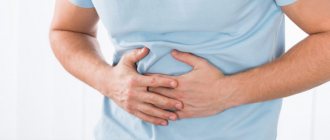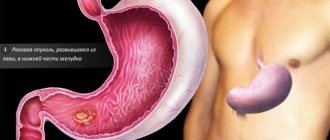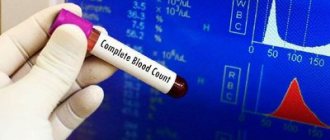Dysbacteriosis is a common disease in which the intestinal microflora is disrupted. May develop due to medications or diseases of the gastrointestinal tract.
The intestinal mucosa is a complete ecosystem inhabited by dozens of species of microorganisms. Their species composition depends on the age of the person, region of residence, diet and other factors. Conventionally, bacteria can be divided into beneficial ones, which are necessary for the full functioning of the gastrointestinal tract, neutral and conditionally pathogenic.
Potentially dangerous microbes can be present in the intestines of a healthy person in minimal quantities without causing disease. The balance between harmful and beneficial “inhabitants” of the intestinal environment is fundamental to digestion and overall health.
When the balance of microflora is disturbed, intestinal dysbiosis occurs. There are more “bad” microorganisms than “good” ones, which disrupts the absorption of nutrients, reduces the protective functions of the mucous membrane, and contributes to the development of serious diseases.
Symptoms of intestinal dysbiosis
The cause of pathological disorders of the intestinal environment can be treatment with antibiotics or anti-inflammatory drugs, an infectious disease, food poisoning, or an improper diet. The imbalance in the species composition of organisms occurs against the background of helminthiases and gastrointestinal diseases. Also at risk are people who are addicted to too strict diets, uncontrollably taking enterosorbents, laxatives, and doing enemas to cleanse the intestines.
An imbalance in the intestinal environment can be suspected by the following signs:
- increased gas formation (flatulence);
- nausea and vomiting
- pain;
- loss of appetite;
- hypersensitivity to certain products;
- bloating and rumbling in the stomach after eating;
- violation of bowel habits. Most patients complain of frequent loose stools, alternating diarrhea and constipation;
- temperature increase;
- bad breath.
Intestinal dysbiosis negatively affects appearance and well-being. Due to nutritional deficiency, the patient experiences weakness and loss of strength, and becomes more irritable. A decrease in the protective functions of the intestines leads to the body being unable to cope with toxins. Patients complain of headaches and other signs of intoxication.
Women note increased brittleness of nails and deterioration in hair growth and hair loss. Against the background of prolonged intestinal dysbiosis, anemia may develop, caused by a deficiency of vitamins and microelements. The skin on the body becomes dry, and on the face, on the contrary, more oily. When the pores are clogged, a rash appears on the face.
The symptoms of intestinal microflora disorders are very extensive and similar to other diseases. To clarify the diagnosis, you need to contact a gastroenterologist and undergo an examination.
Abdominal noises - normal or pathological
Rumbling in the stomach is a spectrum of sounds of varying intensity coming from the organs of the gastrointestinal tract as a result of the movement of gases, liquid or food bolus. A healthy hungry rumbling is inherent in every person. Once in the stomach and then in the intestines, food is broken down due to the secretion of digestive juices inside these organs. For effective treatment, the walls of the gastrointestinal tract are constantly compressed.
Rumbling in the stomach can indicate problems in any organ of the digestive tract
Regardless of the presence of food in the stomach, the muscles contract. If the lumen of the organ is empty, then the gases, air and hydrochloric acid inside interact with each other. Rumbling or other noises occur. When the stomach is full, food, pressing against the walls, dampens the sound. It happens that the “songs” of the stomach are heard regardless of food intake, not only from the stomach. Similar sounds also come from different parts of the intestines. Such noises are not normal, but act as a pathological symptom. They talk about disturbances in the processing and absorption of nutrients at any stage of digestion. The sounds are accompanied by putrefactive processes, excessive gas formation, and an inadequate reaction of the intestinal walls to certain irritants. Abdominal noises may resemble:
- pouring or gurgling;
- bubbling;
- rumbling;
- growl.
In the medical literature, these names are most often used interchangeably, since it is not possible to identify one characteristic sound for a specific symptom. To a greater extent, the nature of the sound depends on the condition and individual characteristics of a particular person.
How to collect stool for dysbacteriosis?
The coprogram allows you to diagnose diseases of the digestive system. Stool culture is carried out to identify the parasitic or infectious nature of the pathology. Before defecation, it is necessary to empty the bladder and carry out hygiene procedures. Cover the bottom of the toilet with paper or use a disposable plastic plate. Feces are collected in the morning or a maximum of 8 hours before delivery to the laboratory in a clean container.
3 days before collecting stool, stop taking antibiotics, laxatives, and iron supplements. 2 days in advance - exclude tomatoes, beets and other foods with a high content of coloring pigments, fatty and spicy foods from your diet. You cannot take the test during menstruation.
Treatment of intestinal dysbiosis
The first stage of treatment for intestinal dysbiosis is diet therapy. Diet adjustments are aimed at limiting or eliminating foods that create a favorable environment for pathogens, irritate the intestines and increase fermentation.
How to treat intestinal dysbiosis will be determined by a gastroenterologist after a comprehensive diagnosis, which includes laboratory tests, x-rays and ultrasound of the abdominal organs. After determining the condition of the gastrointestinal tract and identifying the composition of the microflora, the patient is prescribed the necessary medications. Their action is aimed at treating the disease that led to the imbalance and normalizing the intestinal environment.
Diagnostics
In order to determine the causes of pathological sounds, it is first necessary to exclude organic changes and associated diseases. Along with studying the patient’s symptoms, a physical examination (feeling the abdomen, examining the oral cavity), a number of laboratory and instrumental studies are also used:
- general and biochemical blood test;
- bacteriological culture of stool;
- examination of stool for the presence of hidden blood and increased amounts of fat.
Deviations from the norm, identified by laboratory methods, indicate the organic nature of the pathology. The absence of changes for the worse indicates the mental, neurological or allergic nature of the problem.
A set of instrumental diagnostic methods is used:
- Ultrasound examination (ultrasound) of the abdominal organs allows you to evaluate the physical parameters of the liver, gallbladder and ducts, pancreas, as well as identify the presence of sand or stones;
- Computed tomography (CT) allows you to evaluate the anatomy of tissues and organs. CT is used to diagnose diseases of the stomach and pancreas, liver and gallbladder, large and small intestine. Using this method, hepatitis and cirrhosis, stones and cysts, and malignant processes are detected;
Computed tomography allows a detailed assessment of the anatomical structure of the digestive tract
- X-ray of the intestines, irrigoscopy (using a contrast agent) allows you to determine the causes of constipation caused by disorders of the motor and evacuation function of the large intestine;
- colonoscopy - examination of the condition of the inner lining of the colon using an endoscope. This is how polyps, ulcers, precancerous diseases are identified, and material is taken for biopsy;
- sigmoidoscopy is a diagnostic method of visual examination of the inner lining of the rectum and sigmoid colon.
Data from these studies are necessary to exclude organic intestinal lesions and confirm the functional nature of the disorder.
If there are no deviations from the research data, the doctor will refer you to an allergist, immunologist and psychotherapist. Women are additionally advised to consult a gynecologist.
Diet for dysbiosis
Compliance with nutritional recommendations is a prerequisite for successful treatment of dysbiosis. When planning your diet, avoid the following foods:
- sweets;
- fatty meat, smoked meats, canned food, spicy marinades;
- yeast bread and other products that increase gas formation.
If there is an imbalance in the intestinal environment, foods rich in fiber are beneficial. The diet should be based on porridge, fresh vegetables, dried fruits, lean meat, and dairy products. It is recommended to eat small portions several times a day, avoiding overeating and starvation. It is necessary to drink 1.5-2 liters of water per day and limit carbonated drinks, coffee and alcohol.
Causes of flatulence
The stomach and colon of healthy people contain a certain amount of gases, but in some cases increased gas formation is observed. The causes of flatulence can be different: treatment is not always required. Often the patient just needs to reconsider his lifestyle.
If you eat in a hurry, while running, you swallow large portions of air with food, which leads to bloating. A similar situation occurs in healthy people who abuse carbonated drinks, beer, kvass, and foods that enhance the fermentation process, for example, black bread, legumes, and cabbage. Treatment of flatulence in this case consists of normalizing the diet.
Treatment prognosis, complications, consequences
Rumbling in the abdomen due to functional disorders of the gastrointestinal tract in itself does not pose a danger to the patient’s health. Although it can create a certain physical and psychological discomfort. Extraneous sounds from the intestines are usually heard at the most inopportune moment, which increases the patient’s already heightened neuropsychic stress, and this in turn aggravates the symptoms. It turns out to be a kind of vicious circle. Irritable bowel syndrome is treated over a long period of time and in a complex manner. But, as a rule, the patient will feel a number of improvements from the start of drug therapy and diet.
Intestinal dysbiosis can have more serious consequences if it is not adequately treated with probiotics and diet. Complications are possible due to a long-term imbalance between beneficial and pathogenic bacteria in favor of the latter:
- chronic inflammatory bowel disease - enterocolitis;
- vitamin deficiency and lack of microelements (as a result of impaired absorption capacity of the intestinal walls);
- Iron-deficiency anemia;
- decreased immunity and the risk of other diseases;
- pancreatitis, gastroduodenitis as a result of the spread of pathogenic bacteria along the entire length of the gastrointestinal tract;
- patient's weight loss due to poor absorption of nutrients.
Complications of food allergies are quite rare, but doctors do not completely exclude this possibility. The most famous exacerbations:
- severe decrease in blood pressure (sometimes to the point of fainting);
- Quincke's edema: facial tissues, laryngeal mucosa, difficulty breathing (rarely suffocation);
Quincke's edema can develop from consuming any product
- anaphylactic shock is a dangerous condition of a sudden general reaction of the body to an allergen. Severe laryngeal edema, bronchospasm, stomach pain, nausea, vomiting, and diarrhea develop at lightning speed. The most common allergens on the list are: peanuts and other nuts, wheat, milk, shellfish, eggs.
If the seething and transfusion in the abdomen is caused by an organic lesion of any part of the gastrointestinal tract, treatment is carried out by a professional gastroenterologist, it is aimed at eliminating the specific cause.
What is the cause of frequent flatulence?
Regular flatulence is a reason to be wary. Increased gas formation, which reminds you of itself after every meal, can be a sign of a number of diseases. These include intestinal dysbiosis, enzymatic deficiency, and impaired formation of bile acids. Abdominal bloating can be caused by a mechanical obstruction: a tumor or intestinal adhesion.
In patients with diseases of the liver and biliary tract, flatulence is accompanied by heaviness in the abdomen, nausea, discomfort in the right hypochondrium, and general weakness.
Flatulence occurs with infectious and inflammatory diseases of the gastrointestinal tract. These include colitis, pancreatitis, and intestinal infections. These diseases are dangerous due to their complications and require mandatory treatment in the gastroenterology department.
In people with lactose intolerance, consuming dairy products causes bloating. If increased gas formation occurs against the background of pathological processes in the gastrointestinal tract, treatment of flatulence is aimed at eliminating the main cause of its occurrence. The treatment regimen is determined by the doctor after diagnosis.
People with a healthy gastrointestinal tract can also suffer from bloating. Frequent stress and overexcitation lead to spasms of the smooth muscles of the intestines. This impairs peristalsis, leads to the accumulation of gases and causes a feeling of fullness. To treat flatulence, which is of a psychogenic nature, it is necessary to normalize the psycho-emotional state.
Bloating in pregnant women is caused by an increase in the size of the uterus, which puts pressure on the intestinal walls. Also, the hormone progesterone, produced during pregnancy, causes relaxation of not only the uterus, but also the intestinal muscles, which leads to a slowdown in peristalsis and the accumulation of gases.
Irritable bowel syndrome
The human intestine is a corrugated tube, 7-8 m long. It is divided into two sections - the small and large intestine. The small intestine (its length ranges from 5 to 6 m) connects the stomach with the large intestine. The main function of the small intestine is to digest food from the stomach and absorb the nutrients the body needs. The large intestine, up to 1.5 m long, ends with the rectum and anus. The main purpose of the large intestine is to absorb water and form feces.
Irritable bowel syndrome is an overly sensitive gut that reacts painfully to the most ordinary life situations, such as breakfast, getting ready for work, an upcoming date, not to mention events such as a holiday dinner, a call to the boss, a quarrel with loved ones.
How does increased intestinal sensitivity manifest itself? First of all, by disrupting the progression of content along its logical path from top to bottom. The bolus of food either moves faster than normal, making pendulum-like movements, or remains in some segment of the intestine, or even moves in the opposite direction.
Irritable bowel syndrome is different from stomach ulcers, pneumonia and osteochondrosis.
The main difference is the absence of a morphological basis for the disease. What does this mean? It is well known that, for example, with a peptic ulcer there is a defect in the mucous membrane of the stomach or duodenum, with pneumonia there is an area of compaction of the lung tissue, with osteochondrosis there is a decrease in the height of the intervertebral space. That is, in all of the above examples there is a so-called substrate of the disease - something that causes complaints. With irritable bowel syndrome, there are complaints, but there is no substrate, at least not determined by modern diagnostic studies.
For irritable bowel syndrome, there are diagnostic criteria, the so-called “Rome criteria”, which got their name due to the fact that they were first published in Rome. According to the Rome Criteria, for 12 weeks over the past year (not necessarily consecutive) you may experience abdominal pain or discomfort or bloating, which is relieved after a bowel movement, associated with a change in stool frequency or consistency. The pain can vary from a feeling of mild discomfort to unbearable, may not have a clear localization, spreading throughout the abdomen, or occur at different times in different areas of the abdomen. The pain can be very different - burning, dull, aching, cutting, bursting, squeezing, etc. It usually gets worse after eating. A very important point is the absence of pain at night. You don't wake up in pain.
However, if your sleep is disturbed and you wake up during the night, pain may immediately occur. Bloating usually increases during the day, reaching a maximum in the evening, and is noticeably worse after eating (most often after lunch).
Stools are most often observed in the morning, after breakfast, the number of bowel movements ranges from 2 to 5, with short time intervals. Urge to defecate may occur after every meal. The urge to defecate is also typical in situations where it is not possible - meetings, trips on the subway, commuter trains, in stressful situations. Quite often, due to an urgent urge to defecate, you refuse to visit theaters, cinemas and other public places. However, diarrhea never occurs at night. In addition, stool weight remains normal and, as a rule, does not exceed 200 g per day.
Quite often there is a feeling of incomplete bowel movement. There may be mucus and undigested pieces of food in the stool, but never blood or pus. Immediately before the act of defecation, there is an increase in pain and a significant decrease in pain after it. Most often, the stool is “sheep”, i.e. consisting of small dense fragments, “cork-shaped” - i.e. The first portions of feces are denser than the subsequent ones; there may also be pencil-shaped stools - narrow, long ribbons. So-called constipative diarrhea may occur - loose stools after several days of delay.
You may be plagued by a host of other problems, such as a feeling of a lump in the throat when swallowing, pain in the epigastric region, a feeling of rapid satiety, nausea and pain in the right hypochondrium, pain in the left half of the chest, pain in the muscles, joints, back, headaches , palpitations, a feeling of interruptions in the work of the heart, the inability to sleep on the left side, a feeling of incomplete inspiration, internal trembling, increased urination, weight loss, tinnitus, a feeling of weakness, a feeling of “hot flashes” and dry mouth.
The prevalence of this disease among the population varies in different countries from 9 to 48%. However, due to the rather delicate nature of the complaints, only 14-66% of patients consult a doctor. Most often, urban residents aged 30 to 40 years are affected, with women 3-4 times more likely than men. Most often, irritable bowel syndrome develops after traumatic situations, such as divorce, bereavement, loss of a job or other significant incidents, much less often after a foodborne illness; a hereditary predisposition is also possible. Some scientists are of the opinion that eating chocolate, coffee, alcohol, lentils, beans, dairy products, as well as rich food, changing the usual eating pattern during business trips and travel can be a trigger for the onset of symptoms of the disease.
What to do if you have all or part of the above symptoms? It is imperative to consult a doctor. Firstly, in order to confirm the diagnosis. Unfortunately, there are various conditions in which the clinical picture of the disease partially or even almost completely corresponds to that described above, but the diagnosis is ultimately made differently, the treatment required is completely different, and sometimes urgent. Secondly, in the case of a confirmed diagnosis, treatment must be selected by a specialist, taking into account many factors.
The life prognosis for this disease is favorable. Irritable bowel syndrome does not lead to the development of bowel cancer or diseases such as ulcerative colitis or Crohn's disease. However, it is advisable to be under the supervision of a doctor in whose competence you are confident, whom you completely trust and can tell about the most minor changes in your well-being and the reasons that, in your opinion, caused them. You need to pay attention to how you eat. It is completely unacceptable to eat 1-2 times a day and in large quantities. This diet will undoubtedly cause abdominal pain, bloating, and bowel dysfunction. Eating more than 4-5 times a day and in small portions will make you feel better. In some patients, a certain set of foods leads to increased symptoms, so it is advisable to keep a so-called “food diary” in order to identify foods that may cause a worsening of the condition. It is necessary to write down what foods you consumed during the day, and what unpleasant sensations arose. A fragment of the “food diary” is presented below.
| Product | Symptom |
| rice | – |
| coffee | twice loose stool with mucus |
| Boiled potatoes | bloating, excess gas |
There is no cure for irritable bowel syndrome. There are only medications that relieve the symptoms of the disease. They are quite effective and, for the most part, do not cause side effects. The choice of a particular drug depends on which symptom of the disease is currently bothering you the most. For abdominal pain, medications that weaken intestinal motility can be prescribed; for diarrhea, constipating medications can be prescribed; for constipation, laxatives; and for bloating, medications that reduce gas formation.
Remember! The choice of drug or combination of drugs and the duration of the course of treatment are determined by the doctor!
Unfortunately, the effect of the prescribed treatment is sometimes insufficient, sometimes short-lived, and in some cases completely absent, which is due to the fact that all of the above groups of drugs act only on intestinal functions, without affecting other factors that contribute to the symptoms of the disease.
The mechanism of development of clinical signs (symptoms) of irritable bowel syndrome can be represented as follows: under the influence of psychological stress or a chronic traumatic situation; much less often - intestinal infection; in some people, to which you belong, the intestine becomes overly sensitive.
Firstly, the threshold for pain perception decreases and, secondly, the intensity of pain perception becomes inadequate to the stimulus that causes it. Painful impulses from the intestines come to the brain. Since the brain receives an excessively strong impulse, the response signal sent to the intestine is also excessive. In response to the strong impulse received, a disturbance in the motor activity of the intestines occurs, which you feel as abdominal pain, bloating, diarrhea or constipation.
Can we influence the intensity of the impulse going from the gut to the brain or in the opposite direction? Theoretically we can, but in practice it is quite difficult. Just as the waters of many streams, flowing into a river that carries them to the ocean, become indistinguishable, so the signals from many organs that follow in the interweaving of nerve fibers to the brain are practically inseparable, and it is possible to single out a “path” along which information from the gut follows almost impossible. Can we influence the intensity of the impulse formed in the brain? Yes, and quite effectively.
The effectiveness of both medicinal and non-medicinal methods of influence is recognized throughout the world. Non-drug methods include, for example, individual and group psychotherapy, hypnotherapy; for medications - the use of tricyclic antidepressants, selective serotonin reuptake inhibitors.
Remember! The choice of treatment method is determined by the doctor!
Irritable bowel syndrome does not predispose you to the development of tumors or inflammatory bowel disease. However, in order to live a full life, you must try to avoid overwork, stressful situations, and eating foods that lead to symptoms of the disease; and if you feel worse or if new symptoms appear, visit your doctor.
Honored Health Worker of the Republic of Tatarstan, general practitioner of the highest category, Doctor of Medical Sciences, Professor
F.I. Mukhutdinova
How to treat flatulence at home?
The main way to treat increased gas formation at home is diet therapy. Avoid legumes, beer, kvass, baked goods, limit the consumption of apples and cabbage. All these products cause fermentation. It will be useful to include crumbly cereals, boiled vegetables, and fermented milk products in your diet.
In the absence of individual intolerance, home therapy can be supplemented with herbal decoctions. Teas based on mint, chamomile, dried ginger, and cumin seeds help relieve increased accumulation of gases. Young children can make dill tea.
The cause of bloating and increased accumulation of gases in the intestines may be a pathological process or infection. Treatment of flatulence includes taking medications prescribed by a gastroenterologist.
How to treat intestinal flatulence?
First of all, it is necessary to determine what causes flatulence. Based on the diagnostic results, a treatment regimen is determined. If gas formation is caused by excessive swallowing of air, avoid chewing gum, soda, and snacks on the go. If the culprits of bloating are foods that enhance fermentation, their consumption will have to be limited or eliminated.
To prevent bloating, healthy people are advised to avoid too hot or cold foods, drinking large amounts of coffee, soda, sweets, yeast products, and snacks. Limit vegetables and fruits to radishes, green and onions, cabbage, and apples. The cause of heaving can be oats and products made from them, including muesli and quick cereal-based breakfasts. Some people experience rumbling and bloating after eating fried meat or high-fat foods.
Treatment for flatulence due to pancreatitis includes taking medications that replenish the lack of pancreatic enzymes. If the cause of increased gas accumulation is a tumor or adhesions, surgical treatment is prescribed. Flatulence due to dysbiosis goes away after the intestinal microflora is restored.








